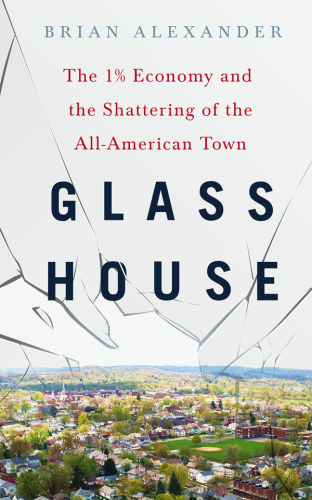
Glass House
The 1% Economy and the Shattering of the All-American Town
کتاب های مرتبط
- اطلاعات
- نقد و بررسی
- دیدگاه کاربران
نقد و بررسی

November 28, 2016
Journalist Alexander (America Unzipped) tells the story of how her hometown of Lancaster, Ohio—about which a 1947 Forbes cover story pronounced “this is America”—has been devastated by a barrage of economic forces. It was built on industry (initially shoe manufacturing, and then glassmaking), and factories employed much of Lancaster’s population for decades. Eventually one glass company, Anchor Hocking, emerged as the focal point, providing steady income and uniting the community. As noted by Alexander, “Residents believed their town was the way America was supposed to be.” But by the 1980s, business and financial changes hit both America and Anchor Hocking, including increased competition and corporate raiders. This forced the company and Lancaster residents into a downward spiral of low wages, fewer job opportunities, heroin abuse, and a general feeling of hopelessness. Through research and interviews with dozens of Lancaster residents, Alexander paints a picture of a town that’s typical of many formerly thriving communities across America. Change is tough, especially with today’s societal disconnection and the “financialization and digitalization of American life.” This is a particularly timely read for our tumultuous and divisive era. Agent: Michelle Tessler, Tessler Literary Agency.

Starred review from December 1, 2016
A journalist examines how corporate America and the politics enabling it have corroded an Ohio city to its very foundation.Alexander (America Unzipped: In Search of Sex and Satisfaction, 2008, etc.) understands Lancaster, Ohio, as perhaps only a native can. He understands intuitively what the city long represented, the communal pride it sustained, and how the shattering of the social contract between industry and community has left it a crumbling shell. This isn't an inherently political book, but those mystified by the election of Donald Trump could well start here. Though specifically about one city, as the author notes, "whatever had happened to Lancaster had happened everywhere else, too." In 1947, amid the postwar boom, Forbes declared of Lancaster, "This is America," devoting most of its 30th anniversary issue to the city as "the epitome and apogee of the American free enterprise system." It was also one of the whitest and most homogenized cities in the country, one that owed much of its prosperity to the Anchor Hocking glass company, which employed many of its citizens and invested back into the community. As recently as 1990, Lancaster considered itself special, and Alexander remains glad and proud that he was raised there (in a family that worked in that glass industry). What happened? Plenty: big-box stores, competition from cheaper foreign goods, union busting and givebacks, bankruptcy and takeover by private equity outsiders with a "strip-and-sell" strategy, cheap Mexican labor, political corruption, flight of the well-to-do to cities that have yet to face such a collapse, and rampant drug dealing and addiction problems among those who remain. The author effectively interweaves the personal stories of those who have lived there and continued to with an analysis of Anchor Hocking and the policies that have made a few rich while reducing the many to hand-to-mouth subsistence or to prison on drug charges. A devastating and illuminating book that shows how a city and a country got where they are and how difficult it can be to reverse course.
COPYRIGHT(2016) Kirkus Reviews, ALL RIGHTS RESERVED.

























دیدگاه کاربران